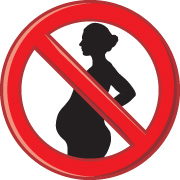 Vladimir Ceresna/PhotoSpin
Vladimir Ceresna/PhotoSpin
Every year, millions of women get pregnant in the United States. Many pregnancies are planned and welcomed, but a surprising number of babies are born as a result of unplanned pregnancies.
According to an NBC News article on the topic, over one-third of pregnancies are unplanned or unintended. The statistic has remained relatively the same since 1982. That means that one in three babies is conceived unintentionally.
CBS News said that three million pregnancies are unplanned every year, yet “the Centers for Disease Control and Prevention says 99 percent of women having sex had used at least one method of birth control between 2006 and 2008.”
Even though precautions are taken, the chance of getting pregnant still exists.
Young sexually active people in particular are susceptible to pregnancies. Some are using contraceptives in the wrong manner or aren't using any methods of preventing pregnancy.
Hoping pregnancy won't happen is not a safe or realistic option. Sooner or later, not using contraceptives while being sexually active could result in pregnancy.
A large percentage of girls are taking oral contraceptives such as the Pill to prevent pregnancy, but they take it irregularly. This increases the risk of conceiving accidentally.
“A new study shows that women who use birth control pills, the patch or vaginal ring are 20 times more likely to have an unintended pregnancy than those who use an intrauterine device (IUD) or implant,” according to a study published in the New England Journal of Medicine and mentioned in the CBS article.
The study, which consisted of 7,500 sexually active female participants ranging in age from 14-45, asked the women to choose a method of contraception to prevent pregnancy for a year.
“They were each instructed about the benefits and side effects of IUDs, implant, birth control pills, patch, ring and contraceptive injection and then allowed to chose which one they wanted to use free of charge” said the CBS News article. Then they were interviewed at three-month intervals by researchers.
Web MD also talked about a study done about contraceptives and found “that 60% of women who experienced an unplanned pregnancy in 1998-2002 were not using contraceptives.”
This particular study was published in the National Health Statistics Report in July, 2012. The “data in this report are based primarily on the 2006–2010 National Survey of Family Growth (NSFG), conducted by the Centers for Disease Control and Prevention’s (CDC) National Center for Health Statistics (NCHS)..."
This data was based on responses from “12,279 women conducted from June 2006 through June 2010, and on the 7,643 interviews with women in 2002."
The "interviewing and data preparation for the surveys in 2002 and 2006–2010 were carried out by the University of Michigan’s Institute for Social Research (ISR), under a contract with NCHS,” said the study.
It is important that a woman understands the different types of birth control available to her and that she knows how to use the contraceptives. Unwanted and unplanned pregnancy rates are still at an all-time high. Women are underestimating their fertility levels and not taking the proper precautions when attempting to prevent pregnancy.
Any questions should be answered by a doctor prior to starting birth control.
Sources:
Castillo, Michelle. "Unplanned Pregnancies 20 times More Likely on Birth Control Pill than IUD, Study Finds." CBSNews. CBS Interactive, 24 May 2012. Web. 08 Feb. 2013.
http://www.cbsnews.com/8301-504763_162-57440927-10391704/unplanned-pregn...
Mosher, William D., Jo Jones, and Joyce C. Abma. "Intended and Unintended Births in the United States: 1982–2010." National Center for Health Statistics. U.S. DEPARTMENT OF HEALTH AND HUMAN SERVICES, 24 July 2012. Web. 8 Feb. 2013.
http://www.google.com/url?sa=t&rct=j&q=&esrc=s&source=web&cd=1&ved=0CDUQ...
"Oopsie Babies? A Third of U.S. Births Unintended, Study Finds." NBCNews.com. NBCNEWS, 24 July 2012. Web. 08 Feb. 2013.
http://vitals.nbcnews.com/_news/2012/07/24/12930475-oopsie-babies-a-thir...
Warner, Jennifer. "More Than a Third of Babies Unintended." WebMD. WebMD, 24 July 2012. Web. 08 Feb. 2013.
http://www.webmd.com/baby/news/20120724/more-than-a-third-of-babies-unin...
Reviewed February 8, 2012
by Michele Blacksberg RN




Add a CommentComments
There are no comments yet. Be the first one and get the conversation started!